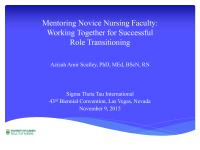Mentorship of novice pediatric critical care nurse practitioners to improve role transition
View File(s)
- Author(s)
- Details
-
Rachael E. Crowe, DNP, RN, CPNP-AC, CNE
- Sigma Affiliation
- Mu Eta
Visitor Statistics
Visits vs Downloads
Visitors - World Map
Top Visiting Countries
| Country | Visits |
|---|
Top Visiting Cities
| City | Visits |
|---|
Visits (last 6 months)
Downloads (last 6 months)
Popular Works for Crowe, Rachael E. by View
| Title | Page Views |
|---|
Popular Works for Crowe, Rachael E. by Download
| Title | Downloads |
|---|
View Citations
Citations
The transition from registered nurse (RN) to nurse practitioner (NP) is difficult for many new graduates, leading to low job satisfaction and poor retention with high cost to the employer (Fitzpatrick & Gripshover, 2016; Horner 2017). A mentorship program was developed and implemented to improve transition to practice.
A six-month formal, structured mentorship program for critical care NPs was implemented at a large pediatric teaching hospital. Mentor-mentee dyads were created using a novel matching algorithm based on career trajectory and mentoring functions, with the novice period defined as the first two years of practice. The dyads viewed a training video and were given optional discussion prompts to use in monthly one-hour mentoring sessions. Pre- and post-program mentee data was collected using the Misener Nurse Practitioner Job Satisfaction Scale (MNPJSS), Nurse Practitioner Role Transition Scale (NPRTS), and Clance Impostor Phenomenon Scale (CIPS). The MNPJSS was used pre- and post-program in the mentors. Narrative feedback was solicited at the end of the program.
Four dyads were enrolled in the study. In the mentees, MNPJSS scores decreased post-program but did not reach statistical significance. NPRTS scores increased significantly, p = .04, showing improved role transition post-program. CIPS scores improved significantly, p = .02, indicating fewer impostor phenomenon characteristics post-program. A positive correlation (r = .8) was found between NPRTS scores and years of prior RN experience, meaning that novice NPs with fewer years of RN experience may have a more difficult role transition. Feedback from the participants was positive, with mentees citing the support, advice, and career coaching provided by the mentors, and reporting time as the biggest barrier to completion of the program requirements.
This small sample of pediatric critical care NPs reported a positive experience in this 6-month mentorship program pilot, and demonstrated improved NPRTS and CIPS scores post-program, without a significant decrease in MNPJSS scores. These findings are limited due to the lack of a control group and the small sample size. Further controlled prospective research with larger sample sizes is warranted to determine any causal relationship between mentorship, successful RN to NP transition, and retention.
This dissertation has also been disseminated through the ProQuest Dissertations and Theses database. Dissertation/thesis number: 28087395; ProQuest document ID: 2446980041. The author still retains copyright.
This item has not gone through this repository's peer-review process, but has been accepted by the indicated university or college in partial fulfillment of the requirements for the specified degree.
| Type | Dissertation |
| Acquisition | Proxy-submission |
| Review Type | None: Degree-based Submission |
| Format | Text-based Document |
| Evidence Level | Quasi-Experimental Study, Other |
| Research Approach | Pilot/Exploratory Study |
| Keywords | Mentor-Mentee Dyads; School to Work Transition; Job Satisfaction; Mentorship Programs |
| Grantor | Georgetown University |
| Advisor | Slota, Margaret; Lebet, Ruth |
| Level | DNP |
| Year | 2020 |
All rights reserved by the author(s) and/or publisher(s) listed in this item record unless relinquished in whole or part by a rights notation or a Creative Commons License present in this item record.
All permission requests should be directed accordingly and not to the Sigma Repository.
All submitting authors or publishers have affirmed that when using material in their work where they do not own copyright, they have obtained permission of the copyright holder prior to submission and the rights holder has been acknowledged as necessary.
Related items
Showing items related by title, author, creator and subjects.
-
Benefits of international online mentoring
Dalcin, Camila Biazus; Barlett, T. RobinDescribe the experience and mutual benefits of a mentor and mentee located in different countries. Some benefits of an online international mentoring are exchange of experiences, to gain understanding of unique aspects of ... -
Mentorship and novice nursing faculty: Working together for successful role transitioning
Sculley, Azizah; Myrick, Florence; Paul, Pauline (2016-03-21)Session presented on Monday, November 9, 2015: In baccalaureate nursing programs in which context based learning (CBL) is used as a teaching-learning modality, it has been observed that there is a shortage of experienced ... -
Developing faculty-student mentor-mentee relationships in a DNP program
Manister, Nancy Neff; Frederickson, Keville C. (2016-03-21)Session presented on Monday, November 9, 2015: The mentoring relationships have been identified as an important influence on professional success. Numerous studies in nursing have described the process and effects, beginning ... -
The effect of a formal mentoring program on career satisfaction and intent to stay in the faculty role for novice nurse faculty
Mariani, Bette A.; Jeffers, Stephanie M. (2016-03-21)Session presented on Sunday, November 8, 2015: Background: The transition from the role of a clinician to that of faculty in an academic setting can be challenging and stressful for novice nurse faculty. A lack of support ... -
The nurse practitioner (NP) mentorship program: Supporting role transition Into practice
Bartley-Daniele, Patricia; McTiernan, Tracy Lynne; LaPera, Camille (2017-07-24)Political, social, and governmental influences have increased the nurse practitioner (NP) demand in the United States (Institute of Medicine, 2010; McMullen & Philipsen, 2012). Graduate NP programs have developed ...





